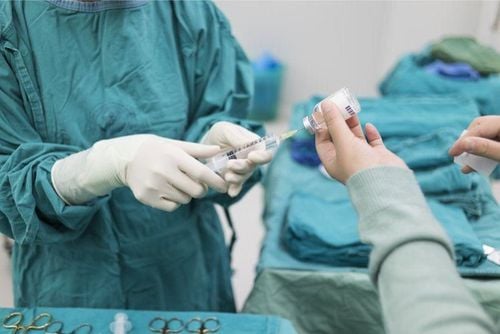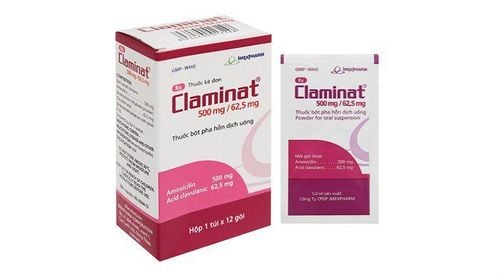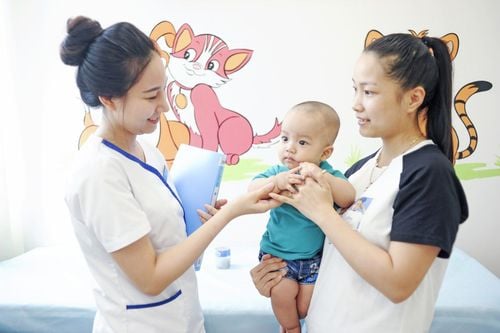This is an automatically translated article.
The article is professionally consulted by Cardiologists and Interventional Cardiologists - Vinmec Central Park International General Hospital.Pneumonia is one of the most common diseases in children. There are many causes of pneumonia in children, but the main ones are bacteria and viruses. The disease can be detected early based on recognizable symptoms. Early detection, treatment, and proper care will reduce morbidity and mortality in children.
1. Is pneumonia dangerous for children?
Pneumonia, also known as bronchopneumonia, has a high incidence and is the leading cause of death in children, especially children under 1 year of age. When pneumonia, children are very susceptible to respiratory failure and if not treated promptly, the child can die. In addition, when children have pneumonia, children may also have high fever, convulsions, stop eating, stop feeding, diarrhea leading to dehydration, electrolyte disturbances,... Therefore, parents need to pay attention to early manifestations of pneumonia, danger signs and emergency conditions to bring the child to the hospital in time.Trắc nghiệm: Nhận biết sớm dấu hiệu chậm phát triển thể chất và trí tuệ ở trẻ
Nếu 6 tuổi không biết đếm số, 7 tuổi vẫn chưa phân biệt được giữa thực tế và tưởng tượng thì có thể bé chậm phát triển thể chất và trí tuệ hơn so với bạn bè cùng lứa. Bạn đã nhận biết được các dấu hiệu bất thường sớm này chưa? Cùng làm nhanh bài trắc nghiệm sau để trang bị thêm kiến thức cho mình nhé!
The following content is prepared under supervision of Thạc sĩ, Bác sĩ y khoa, Ma Văn Thấm , Nhi , Phòng khám Đa khoa Quốc tế Vinmec Dương Đông(Phú Quốc)
2. Which children are at high risk for pneumonia?
Young children under 1 year of age, especially infants (the first 28 days after birth). Premature, low birth weight babies. Babies are not breastfed. Children with congenital heart diseases, respiratory malformations, congenital immunodeficiency. The rearing conditions are not good, children are exposed to dust and pollution. There are allergies and sensitivities.3. How does a mother know that her child has pneumonia?
Early detection and early treatment of pneumonia will help reduce mortality from pneumonia in young children. Signs that a mother or caregiver may suspect a child has pneumonia is when the child has signs of upper respiratory tract infection with cough and runny nose, wheezing:Cough : Initially, the child has Cough may be less, then increase, with sputum and accompanied by moderate to high fever, may lower the temperature. Runny nose from little to a lot. Wheezing or wheezing. Children who are tired and fussy may refuse to eat or breastfeed.
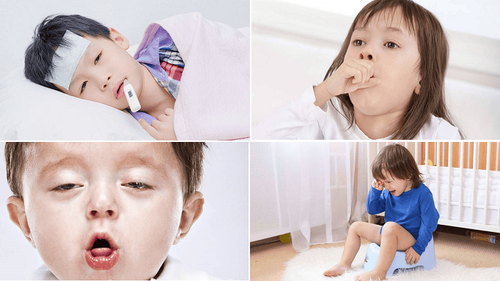
Rapid breathing :
Rapid breathing is the first sign to think of pneumonia in a young child, the mother will count the child's breathing by leaving the child to lie still, without strenuous activity, counting the movement of the chest or abdomen for the full 1 minute.
Children are considered tachypnea if breathing:
Over 60 breaths/minute (under 2 months old). More than 50 times/minute (2 months - 1 year old). Chest indrawing (over 1 year old). Chest indrawing Thoracic indrawing: This is a sign that the child is trying to breathe hard, in addition, some children also have nasal breathing, moaning, foaming in infants, pulling. the intercostal muscles (the soft part between the ribs that recedes when the child breathes in).
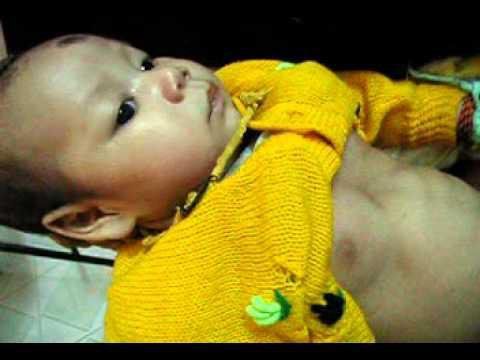
4. When does the child need to be hospitalized?
Not all children with pneumonia require hospital treatment. Children can be treated at home if the pneumonia is mild; Avoiding hospitalization can expose your child to additional bacteria and viruses at the hospital called a nosocomial infection.4.1. When does a child with pneumonia need to be hospitalized for treatment?
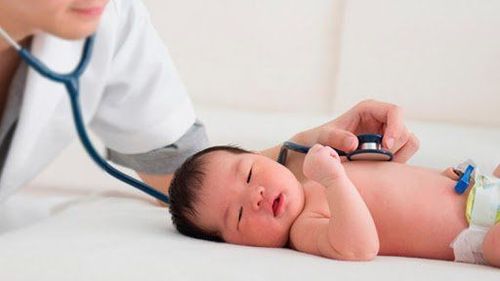
4.2. When to take a child to the emergency room right away? That's when the child shows signs of danger, life-threatening.
In children under 2 months: With symptoms such as refusing to suck or sucking poorly, convulsions, lethargy - difficulty waking the baby up, fever or cold, wheezing or purple around the lips, purple veins all over the body, ... In children from 2 months to 5 years old: The child cannot drink anything, convulsions, lethargy - difficult to wake up, breathing raspy.
5. How to prevent children from getting pneumonia?
To know how to prevent pneumonia, you need to understand what the common causes of pneumonia in children are.In young children, the main causes are caused by bacteria, viruses, parasites, fungi, ... In older children, in addition to the above causes, other causes can also be encountered such as: Aspiration pneumonia oil, gasoline, chemicals,...
Viruses account for 70% of cases of pneumonia in children, common viruses are: respiratory syncytial virus, influenza virus, adenovirus,...
Two The most common bacteria today are pneumococcus and Haemophilus influenzae. Pneumococcal can cause meningitis in young children, which is a very dangerous complication and has a high mortality rate.
So, how to prevent children from getting sick?
Should breastfeed exclusively for the first 6 months, in breast milk there will be a lot of antibodies passed to the baby to help the baby fight against invading agents that cause pneumonia. Keeping the environment clean and limiting dust is also a way to limit pneumonia for children. Fully vaccinated. In addition to antibodies from the mother, antibodies from antibiotics will help the child create his own immune barrier. Keep children warm, avoid cold, avoid sudden changes in ambient temperature. Caregivers washing their hands before and after care is also a way to limit the spread of bacteria to the child. In addition: Nurturing children well, ensuring their health, supplementing with vitamin A, zinc, ... also helps children prevent pneumonia. The pediatric department at Vinmec International General Hospital is the address for receiving and examining diseases that infants and young children are susceptible to: viral fever, bacterial fever, otitis media, pneumonia, etc. .. With modern equipment, sterile space, minimizing the impact as well as the risk of disease spread. Along with that is the dedication from the doctors with professional experience with pediatric patients, making the examination no longer a concern of the parents.
Please dial HOTLINE for more information or register for an appointment HERE. Download MyVinmec app to make appointments faster and to manage your bookings easily.







![[Video] How to take care of children in summer?](/static/uploads/small_20190730_112639_927206_cham_soc_tre_mua_he_max_1800x1800_png_7a3b48f9f3.png)
